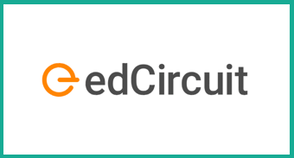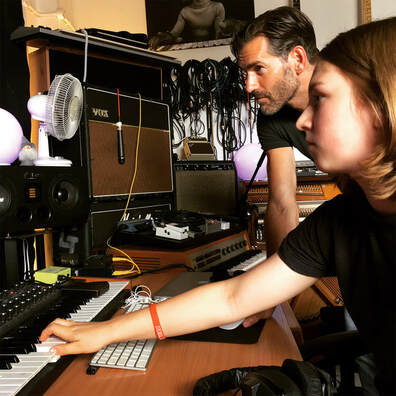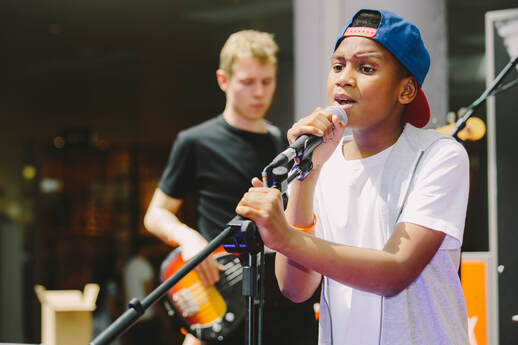
Recently, the Academy has begun a partnership with Soundtrap, which has provided students with access to the innovative online studio, which has opened up new possibilities as students work on their audio creation skills in a number of environments.
In this Q&A, Rowena shared some perspective on the genesis of Song Academy and the songwriting skills they are helping students to develop. She also shared insight on the power of technology, specifically Soundtrap, in enhancing the overall experience of music education and creation.
Rowena Atkins: 11 years ago, when my daughter Matilda was 8 years old, she wrote a song out of the blue. It was a song that meant the world to her. Helping her to structure her song and express her feelings was the genesis of Song Academy – to enable all young people to express themselves and be heard. Song Academy is a space to inspire, celebrate individuality and encourage a sense of belief. It empowers young people at a formative time in their life, and enables them to use songwriting as a tool to speak up about important issues that affect them, which becomes even more important in an age of technology and social media where they might feel their voice isn’t getting heard. The songs they write have the potential to spark debate and shape their future, and that’s an incredible thing for generation Z, who want to speak up about these issues.
What are some of the component skills of songwriting that students learn by participating in your programs? How do these skills help them in other areas of academics?
RA: Number 1 is the skill of being creative, which means perceiving the world in new ways, finding hidden patterns, making connections between seemingly unrelated phenomena, and generating solutions or providing a commentary. Playing with words and music is the perfect vehicle for doing these things. Songwriting is like going to the “mind gym” and the more you practice the more creative you are!
Number 2 is the skill of communicating powerfully. Our young songwriters practice communicating their thoughts and feelings in an engaging way. The increased confidence and self-belief empowers young people to speak up and share their voice with their friends, their community and the world. It helps them develop their identity and find their place in the world.
Number 3 is the skill of listening, taking on new ideas and thinking from different perspectives. It encourages critical listening and thinking, which is useful in many other areas.
Number 4 is the skill of giving feedback to your peers and taking on board feedback.
Number 5 is the skill of collaboration from writing songs with their peers. Building on other people’s ideas and working together to create a song which they are all happy with is a very crucial skill.
All these skills developed through songwriting are transferable to other school subjects and are skills for life.
RA: Members of Song Academy love using Soundtrap! It opens up a whole new world of sounds that some of our young songwriters may have never had access to, as well as being a quick and easy way to record their own sounds. The ability to collaborate with the Song Academy songwriting leaders and members of their songwriting group is also a key feature that makes Soundtrap such a great tool. With the chat feature, they can discuss lyrical ideas or suggest changes. Our members can work on their songs during the week and have something to share with the Song Academy members at the next session.
What advice would you give to teachers―including music teachers, but also teachers in other academic subjects―who don’t have training in songwriting, but who would like to incorporate songs and music into their learning environment?
RA: I would say to all teachers that there are many benefits of using music and songwriting in their learning environment to help engagement, motivation and learning! It’s a great way to get to know students and connect with them. A good place to start is asking your students what music they enjoy and creating a playlist, plus sharing the songs you love and why.
To help engagement and memory retention of different subjects, ask your students how they’d deliver the subject content in the style of their favorite songwriter/artist/rapper. Have a battle of the songs or rap battles to revise subjects.
In civics, citizenship, or personal health and social education (PHSE) lessons you can ask your students to think about what’s important to them or to their friends and communities, and write a song about it. Or, you can have students pick their favorite song and rewrite a section in their own words. Ask them to be an activist for the future they want, and ask what they would like to say about it. Make a song map to get ideas down and use it to create new combinations.
In music lessons, encourage students to study a number of songs in different genres. Ask them to notice the different instrumental parts, song structure, chord progressions, rhythms and melodies. Give them different songwriting briefs to write their own songs using Soundtrap to layer up different instruments and sounds.
Remember there is no right or wrong way! Make sure your students know to stay authentic to themselves and tell their own story.
RA: We have an exciting program of holiday songwriting workshops in October and December. Participants get to exercise their creativity, develop their songwriting talents, meet and collaborate with like-minded peers, and get expert feedback.
We have songwriting workshops for groups writing a song together, as well as songwriting workshops where participants write their own original songs. These workshops are tailored for different age groups (8-10, 11-12, 13-15 and 16-18 year olds) and different levels of songwriting experience. All information is at https://www.songacademy.co.uk/workshops/holiday-workshops/
Another thing we provide is an excellent song feedback service throughout the year, where aspiring young songwriters can get insightful feedback on their songs, to make them the best they can be and take their songwriting to the next level. We provide feedback on the three key areas, which are lyrics, melodies and production/structure. More information is at https://www.songacademy.co.uk/expert-song-feedback-2/
This article originally appeared on edCircuit














